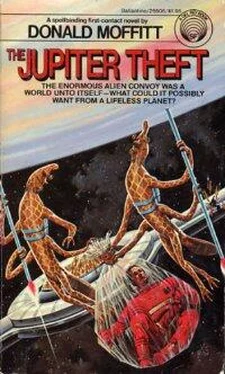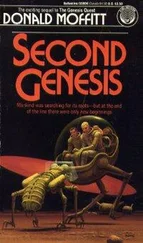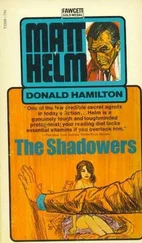Quentin was still trying. “Yeah, but listen, Mike—”
Mike sat up, an astonished expression on his face. “Hey, it just came to me! All distances are the same! Give or take a couple of months, anyway. We can reach any star within a hundred light-years in about three years of travel. The hell with them back home! If you want to spend five years traveling, you can have any star within three hundred light-years. Hell, make that ten years—no, twelve years…”
He stopped and looked round at the circle of faces.
Kay Thorwald said it for him. “We own all the stars in a thousand light-years. That’s what we traded Jupiter for.”
The celebration had grown suddenly quiet. Into the silence, Jameson said: “What’s the price? Do we dismantle Saturn next?”
“Hell no!” Mike said briskly. “The Cygnans spent six million years traveling with a first-generation technology. We’ll have a second-generation technology. We’ll find a better way.”
“There’s our snowball,” Jameson said. “Let’s see if we can nudge it into the cup.”
Through the forward viewscreen the comet was an enormous sphere of frozen slush, fifty miles in diameter, according to the instruments. Out here in the cometary halo, far beyond the orbit of Pluto, it had no tail. According to Maybury’s calculations, it grew its tail only once every two million years or so, when its elliptical orbit took it close enough to the Sun to vaporize its sherbetlike surface.
“Right on target, Skipper,” Li said from his console in the circular control room. His English had improved a lot in ten years.
It had taken only ten years to build the first starship. Mike had been right. The principle behind the Cygnans’ energized-photon drive was simple. The human race would have had it in another century anyway; the technical and theoretical groundwork already had been laid.
Of course, the humans had made a lot of improvements.
Sue lifted her head from the communications console to admire the view outside. The ten years had fine-etched her face, making it even more striking. Jameson was glad their daughter looked like her, not him.
“Will that really take us all the way to 61 Cygni?” she said.
“Sure,” said Mike Berry. “It’s mostly water ice. Some methane, ammonia, carbon dioxide dissolved into it, of course, but the engine’s only going to eat the hydrogen anyway. There’ll even be enough of it left at the end to keep shielding us from interstellar hydrogen. We’ll use any of that it picks up, too. Who needs a Jupiter? We don’t have to boost as much mass as the Cygnans, and we don’t have to push it as hard.”
“We’ll never run out of interstellar fuel,” Jameson said. “There’s a hundred billion cometary nebulae out here beyond Pluto. All our starships’ll have to do is come out and chase them down. And we can do that on a tank of water.”
At constant one-g acceleration, it had taken less than three weeks to reach the fringes of the cometary halo and find their snowball. There would be similar swarms of unborn comets around every star, extending light-years into space and mingling with the cometary halos of their neighbors. There would always be a refueling stop. Man would never have to vandalize the planets, as the Cygnans had done.
The two feathery humanoids chattered excitedly. They were temporarily free of their engine-room duties, and Jameson had invited them up to the control room for a look. This was a big moment for them.
Slowly, the first human starship drifted toward the comet’s frozen core. It was a mere two hundred meters long, a slender needle with a hundred-meter cup at one end, so that it resembled nothing so much as a gigantic golf tee.
“Contact!” Jameson said.
The snowball settled into the cup, or the ship landed head first on the comet, depending on how you wanted to look at it. The important thing was that the tail of the ship was pointed in the right direction. Before they’d gone very far, the ship would be half buried.
By the time they got ready for turnaround, the snowball would be down to a more manageable size. The ship would be somewhere in the center of the comet by then, firing its photons through a tunnel melted through miles of snow. All that mass around it would be more than adequate to shield it from the diminishing hail of impinging radiation, and the drive beam itself would handily ward off the interstellar hydrogen directly ahead.
There was no spin section. They would be in free fall for only a few weeks, subjective time. Maybe later ships, with farther to go, would work out a spinning cage or some other device pivoted along the axis of the needle.
The forward screen went blank. The ship’s other senses took over. The humanoids had a drink with them to celebrate, then went back to the engine room.
“We’ve got us some friends,” Mike said, watching the pink creatures scamper down the companionway. “Wait till their people start working on their own version of the star drive. In another ten years, we’ll be roaming the galaxy together.”
Jameson switched on another outside pickup, and the viewscreen was suddenly filled with the splendor of the Great Nebula in Andromeda, a whirlpool of stars sparkling with gems of many colors.
Maybury came over for a look. “They won’t get there for two million years,” she said.
“Maybe that’s what they were getting up their nerve for,” Jameson said. “The big jump. It took them six million years to work up to it.”
“They can’t turn back now,” Sue said. “We’ll never see them again.”
Mike gave a short bark of a laugh. “Want to bet? When they reach the Andromeda galaxy, we’ll be waiting for them. They’ve only got a short headstart.”
“Two million years,” Li said thoughtfully. “What will we be by then? What will they be?”
“A partnership with the descendants of the humans aboard,” Jameson said confidently. “The Cygnans lost their purpose when they started running six million years ago. Maybe the humans will substitute theirs.”
“Some day we’ll cross the gulf and rejoin them,” Maybury said, staring at the screen.
Jameson switched off Andromeda. “Some day,” he agreed. “Right now we have a galaxy of our own to discover.”
The engines fired.
Donald Moffitt was born in Boston, and now lives in rural Maine with his wife, Ann, a native of Connecticut. A former public relations executive, industrial film maker, and ghostwriter, he has been writing fiction, on and off, for more than twenty years under an assortment of pen names, including his own, chiefly espionage novels, and adventure stories in international settings. The Jupiter Theft is his first full-length science-fiction story and the first book of any genre to be published under his own name. “One of the rewards of being a public relations man specializing in the technical end of large corporate accounts,” he says, “was being allowed to hang around on the fringes of research being done in such widely disparate fields as computer technology, high-energy physics, the manned space program, polymer chemistry, parasitology, and virology—even, on a number of happy occasions, being pressed into service as an unpaid lab assistant.” He became an enthusiastic addict of science fiction during the Golden Era, when Martians were red, Venusians green, Mercurians yellow, and “Jovian Dawn Men” always blue. He survived to see the medium become respectable, and is cheered by recent signs that the fun is coming back to SF.












